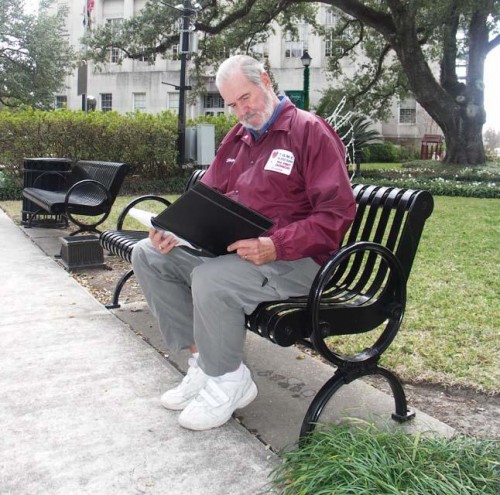
Vandebilt High seniors share Christmas spirit
December 16, 2010UL Lafayette’s fall 2010 outstanding graduates announced
December 20, 2010It is always assuring to have someone willing to go to bat for you. Securing an expert that knows the way around otherwise unfamiliar territory and who is skilled in dealing with the procedures, policies and politics of getting something in one’s best interest accomplished is always a benefit.
For a multitude of minors who have fallen victim to abuse or neglect imposed on them by their own parents, the need for someone to step forward, insure their rights and see to it that they are given opportunities to live in healthy environments is critical.
Fortunately for kids in those circumstances there are people like Merkle Kornegay of Houma.
A 66-year-old retired insurance agent, Kornegay n known as “Skipper” to family and friends n along with his two partners at the time, sold Coastal Insurance Service in Houma 14 years ago to a national interest that reopened the business as USI Gulf Coast.
Kornegay and his wife, Hilda, have already raised their children and have four grandchildren, ranging from a freshman at LSU to a 6-month-old. Yet, four years ago when a friend introduced them to the needs experienced by children in homes where habits and actions of adults endanger kids, they knew they had to get involved.
The Kornegay’s became volunteers with Court-Appointed Special Advocates, took the necessary training and became familiar with working in the legal system on behalf of children who are victims of abuse or neglect.
“Our function is to see that all the needs of a child in state custody are met,” Kornegay said. “We advocate before the court system on their behalf for the various things that may be needed to give them a fruitful life.”
Kornegay explained that in addition to making and filing reports, and offering testimony to judges, he and other advocates will meet with the children that make up their case files, are in close contact with foster parents and report on the progress made or not made by parents who have been court ordered to undergo programs ranging from anger management to drug rehabilitation, in many instances on a monthly basis.
“We meet no less than twice a year in the courtroom,” Kornegay said. “There are various hearings ongoing while [children] are in state custody. And we may have special hearings to determine the status of the child.”
According to the Child Welfare League of America, nearly 25 percent of the population in Louisiana is under the age of 18. In 2006 n the most recent year for available statistics n 12,472 children were substantiated or indicated as having been abused or neglected. That figure was reported to be 1 percent higher than the previous year. And according to those working within the justice system the number of victimized children continues to grow.
Kornegay noted that in Terrebonne Parish alone, CASA is now serving 91 children. He also revealed that there are approximately 30 kids in the parish that have been placed in state custody but do not have an advocate because of limited manpower.
Although other registered child advocacy organizations exist in other parts of the country, CASA is the only one locally. “Nobody else independent of the state government goes to court to advocate on behalf of the child other than a court appointed attorney,” Kornegay said.
“I would venture to say that probably the economy has a little something to do with [problems of abuse and neglect],” he said. “I know that we’re blessed down here to not be bearing the full brunt of what’s been going on countrywide. But still in all we’ve had our issues with the oil spill and the various other things that have gone on. I think sometimes parents just get frustrated and rather than find an appropriate way to vent their frustration they take it out on the children.”
Although the local CASA office has only five compensated employees and a force of non-paid volunteers, ihiresocialservices.com used a database of 180,699 social workers to list the average salary for a paid court-appointed child advocate in Louisiana as ranging between $30,000 to $40,000 a year.
Kornegay said he has worked on four primary cases involving seven children since he became a CASA volunteer. In one case, the child was reunified with the parents. Another is in the process of reunification. A third case saw a child put up for adoption and in the fourth case the courts have terminated the rights of the parent involved.
CASA volunteers work out of a 1,000-office national network. In Terrebonne Parish CASA Executive Director Stacey Martin said that her office alone has 51 volunteers and has trained 186 advocates since being established in 2000.
Martin said that court appointed child advocates undergo 30 hours of legal training, a process of interviews and background checks. They are then sworn in by a judge to become official officers of the court. From that point, assigned cases become the responsibility of the advocates, who are to give complete and accurate records of all activities involving a child in state custody.
“The CASA volunteer follows [a] child throughout his or her entire time in foster care, no matter where that child may move. [A Department of Children and Family Services] caseworker cannot do that. Caseworkers [have] many cases and they have to work with the entire family,” Martin said in respect to how a court appointed child advocate can focus attention on the specific children involved.
Family law attorney Carolyn McNabb helped found the Terrebonne CASA chapter. She said that having court appointed advocates serve in the best interest of children, without outside influences tainting their actions, is a benefit for both the child and the courts.
“The advocate reports directly to the judge. Sometimes when cases come up the first thing a judge will say is, ‘Where is the CASA volunteer?’” McNabb said.
“The [DCFS] has come to appreciate CASA as an aide to them rather than an adversary. It is one of the things that I’ve ever done in community service work that I am the most proud of,” McNabb said.
Thirty-second Judicial Court Judge Randall Bethancourt voiced personal appreciation for Kornegay and other child advocates.
“Mr. Skipper appears before me regularly. He is always prepared n over-prepared even. In cases involving even the worst abuse and neglect, Skipper maintains his professionalism, empathy and sound judgment. He provides an unbiased voice for the mistreated. He goes above and beyond his duties, helping children on his own personal time, often using his own resources to assist his CASA children,” Bethancourt said.
During the past year more than 70,900 court appointed advocates responded to the needs of 237,000 children placed in state custody nationally.
For Kornegay 2010 ended with him being recognized as the CASA Child Advocate of the Year in Louisiana. In turn, his name has been added to a list of contestants for recognition as the nation’s top child advocate of the year during a CASA conference that will take place in Chicago in March 2011.
“The [real] reward is to see a child in an appropriate setting,” Kornegay said. “People need to be aware of the magnitude of the problem we have as a society with these children being abused and neglected.”
“Mr. Skipper has become my hero because he is always there when I need him,” Martin said.
Kornegay had a long career in the insurance industry, and he and his wife have raised their own children. But now he finds his identity in offering advocacy to kids that need him through the business of assurance.
Court-appointed child advocate Merkle “Skipper” Kornegay looks over notes outside the Terrebonne Parish Courthouse. Kornegay has been named the state Child Advocate of the Year for 2010. MIKE NIXON










